

While three-quarters of children with cancer conquer the illness, the treatments, involving surgery, chemotherapy, and radiation, may yield severe and long-term consequences. Among these, there is the risk of developing a second cancer during adulthood as a late-effect. In women, the chances of breast cancer risk were high.
A recent investigation led by researchers at the Princess Máxima Center delved into the likelihood of breast cancer among women previously treated for childhood cancer using anthracycline chemotherapy, including doxorubicin. This extensive study examined the medical histories of almost 18,000 childhood cancer survivors treated from 1946 to 2012 across the Netherlands, France, the United States, and Switzerland. The findings from this research have been published in the prestigious journal Nature Medicine.
Certainly Elevated Cancer Risks
A global team of researchers, led by ProfProf. Leontien Kremer and Dr. Jop Teepen, uncovered a significant connection. Among the 17,903 survivors in their study, 782 were later diagnosed with breast cancer. Their investigation focused on identifying which treatments correlated with the subsequent development of breast cancer.
Notably, women treated with high-dose doxorubicin, without chest radiation, faced an almost six-fold higher risk of breast cancer before turning 40 (3.4%) compared to the general population (0.6%). Among a small subset who received both chest radiation and high-dose doxorubicin during childhood, the risk was even more pronounced, with an estimated 8.1% chance of breast cancer before age 40.
Breast Cancer Screening for Childhood Cancer Survivors
Starting five years post-diagnosis, children and adults treated for childhood cancer undergo regular check-ups at the Princess Máxima Center’s LATER outpatient clinic. These examinations aim to detect potential long-term treatment-related complications, such as development of secondary cancers. In light of their recent findings, the researchers advocate expanding breast cancer screening guidelines for childhood cancer survivors.
Yuehan Wang, a valued member of the Kremer group at the Princess Máxima Center for pediatric oncology, contributed to this study as part of her Ph.D. research. She says, “Anthracyclines are still an important part of the treatment for more than half of children with cancer. The dose that is now prescribed is on average much lower than in the past, but there are still children who need a high dose of these drugs in their treatment.”
“We have known for some time that anthracyclines can be harmful to the heart, so the importance of keeping the dose of this type of chemotherapy low was already clear. Developing a second cancer is a rare but serious late effect of childhood cancer treatment. Our results underline the need to reduce the dose of doxorubicin in children whenever possible.”
Prof. Dr. Leontien Kremer, research group leader at the Princess Máxima Center for pediatric oncology, who led the study, says, “We work hard to make treatment for children with cancer more effective, and to improve the quality of life during and after treatment. In our research we saw that the majority of survivors fortunately do not get breast cancer at a young age. But a number of patient groups have a higher risk of developing breast cancer.”
“Women who received chest radiotherapy as a child are screened for breast cancer from the age of 25, because it was already known that they are at an increased risk. Based on these new results, we aim to expand international guidelines for breast cancer screening, so that women who received a high dose of doxorubicin are also screened early.”
more recommended stories
 Nanoplastics in Brain Tissue and Neurological Risk
Nanoplastics in Brain Tissue and Neurological RiskKey Takeaways for HCPs Nanoplastics are.
 AI Predicts Chronic GVHD Risk After Stem Cell Transplant
AI Predicts Chronic GVHD Risk After Stem Cell TransplantKey Takeaways A new AI-driven tool,.
 Red Meat Consumption Linked to Higher Diabetes Odds
Red Meat Consumption Linked to Higher Diabetes OddsKey Takeaways Higher intake of total,.
 Pediatric Crohn’s Disease Microbial Signature Identified
Pediatric Crohn’s Disease Microbial Signature IdentifiedKey Points at a Glance NYU.
 Nanovaccine Design Boosts Immune Attack on HPV Tumors
Nanovaccine Design Boosts Immune Attack on HPV TumorsKey Highlights Reconfiguring peptide orientation significantly.
 High-Fat Diets Cause Damage to Metabolic Health
High-Fat Diets Cause Damage to Metabolic HealthKey Points Takeaways High-fat and ketogenic.
 Texas Medical Board Releases Abortion Training for Physicians
Texas Medical Board Releases Abortion Training for PhysiciansKey Takeaways Texas Medical Board has.
 Acute Ischemic Stroke: New Evidence for Neuroprotection
Acute Ischemic Stroke: New Evidence for NeuroprotectionKey Highlights A Phase III clinical.
 Statins Rarely Cause Side Effects, Large Trials Show
Statins Rarely Cause Side Effects, Large Trials ShowKey Points at a Glance Large.
 Anxiety Reduction and Emotional Support on Social Media
Anxiety Reduction and Emotional Support on Social MediaKey Summary Anxiety commonly begins in.

Leave a Comment